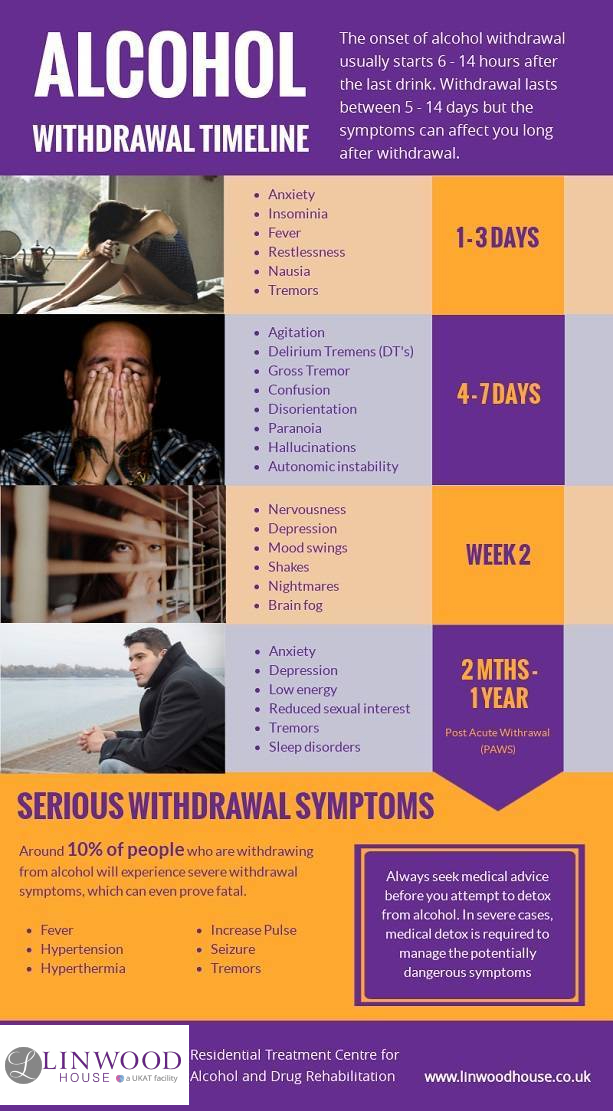The onset of alcohol withdrawal usually starts 6 to 14 hours after the last drink. Withdrawal lasts between 5 – 14 days but the symptoms can affect you long after withdrawal.

In fact, as your blood alcohol level is decreasing, you are already entering the detox phase of your alcohol rehabilitation.
Once this detox stage starts, alcohol withdrawal usually lasts between 5 and 14 days, depending on a number of factors –
- Your level of dependency
- How much you have been drinking
- How long you have been drinking
- Your age
- Gender
- Your general health
In most cases, the symptoms you experience are uncomfortable but in other cases, they can be very severe, and even life-threatening. This is why it is recommended that you always seek medical help before you attempt alcohol detox and rehab.
Below is a list of the most common withdrawal symptoms and a timeline of when they appear.
1 – 3 days after last drink
4 – 7 days after you stop drinking
- Agitation
- Delirium Tremens (DT’s)*
- Gross Tremor
- Confusion
- Disorientation
- Paranoia
- Hallucinations
- Autonomic instability
* Delirium tremens (‘the DTs’) is the most severe form of alcohol withdrawal. It usually occurs 2-5 days after stopping or reducing alcohol consumption.
The severe symptoms include:
- Agitation
- Confusion
- Instability
- Hallucinations
Medical assistance is needed to treat this state of the body and mind.
Serious Alcohol Withdrawal Symptoms
Around 10% of people who are withdrawing from alcohol will experience severe withdrawal symptoms including:
- Fever
- Increased blood pressure
- Increased body temperature
- Increased breathing rate
- Increased pulse
- Profuse sweating
- Rapid breathing
- Seizure
- Tremors
These symptoms can be extremely serious and life-threatening so medical advice and supervision are required.
Medicated detoxification can be used (under medical supervision) to manage these symptoms and ensure you are able to detox safely. Many people choose to have a medical detox within a residential unit where they can be looked after and supervised 24/7.
Longer-term symptoms of alcohol withdrawal
You may be detoxified of alcohol within a couple of weeks, but some people do experience longer term symptoms, which may persist for many months. These symptoms are known as Post-Acute Withdrawal Symptoms or PAWS and include:
- Anxiety
- Decreased energy
- Depression
- Reduced sexual interest
- Sleep disorders
- Tremors
Detox is only the first stage of rehabilitation
It is also important to look at the bigger rehabilitation picture. Getting the alcohol out of your bloodstream and managing withdrawal is only the first part and does not address the issue and triggers that lead to your alcohol dependency.
Alcohol rehabilitation, or rehab, is the process whereby you look at the psychological aspects of your addiction. Only then can you put in place tools and techniques to keep yourself alcohol-free and get your life back on track.
